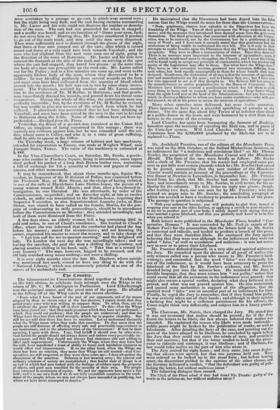rbe enuntrp.
The GloucestersLire Conservatives dined together at Tewkesbury on the 24th ultimo, to celebrate their triumph over the Whigs in the return of Mr. C. W. Codrington to Parliament. Lord Ellenborough was the principal orator, and the great man of the party. He alluded to the falling off of the Whig voters at the recent election-
" From what I have heard of the zeal of our opponents, and of the means adopted by them to obtain votes at the last election, I cannot doubt that they polled every voter who was willing to support them. To what, then, are we to attribute the great falling off in their numbers? To this—that the Whigs have been found out; that they made promises which they have not performed— which they could not perform ; that the people are undeceived ; and that the Whip have thus lost their chief strength, which lay in popular credulity. But still we are told that there has been no reaction. Let us understand distinctly what the Whigs mean when they make this assertion. Do they mean that the people are still desirous of effecting every safe and practicable improvement in our institutions, and in the administration of the Government ? If that be their meaning, I agree with them. I say, God forbid it should ever be otherwise ; God forbid the people should not always desire and enforce every practicable im- povement, and that they should not always find statesmen able and willing to effect such improvement. Unfortunately the Whip, where they may have had the will, have manifested a want of ability to frame such legislative measures as -would effect real improvement. If, on the other hand, when the Whigs say there has been no reaction, they mean that Whip are still trusted—that Con- servatives are still suspected, as they were three years ago—I deny altogether the ciirrectness of the assertion. Delusion is fast wearing away; the natural and ordinary relations of society are reestablished ; that fearful state of things is at an end in which bad men looked with the feelings of robbers upon the property of others, and good men trembled for the security of their own. The people have returned to sentiments of equity. We and our opponents have again a fair held ; and it is our own fault if we do not fully reestablish ourselves in the coed- hence of the people, whom we may not always have succeeded in gratifying, but whom we have never attempted to deceive." He maintained that the Dissenters had been duped into the fable notion that the Whigs would do more for them than the Conservatives-- "Now, gentlemen, observe how valuable to the Dissenters has been the friendship of the Whip. Two of their grievances the Whip undertook to re- move; and the measures they introduced were deemed worse tient the grievances themselves. The third grievance, that connected with education at the Univer- sities, was to be removed, not by the Government, but by a gentleman of the name of Wood ; and I have seen it recently stated that that gentleman had the misfortune of being unable to understand his own bill. Nor is it only ha their attempts to confer benefits upon the Dissenters that the Whigs have shown their incapacity. They were to effect a commutation of tithes. Have they done se? There is no measure more important to the interests of agriculture—none, I think, which would tend more to strengthen the Church ; and I trust the Clergy will be found ready to accept any principle of commutation which the wisdom sad equity of the Legislature may offer to them. But what have the Whigs done? They have, in two successive sessions, produced two measures, differing from each other, but both equally unacceptable to those for whose benefit they were designed. Gentlemen, the declaration of all men is that the interests of a,gricultu. rists and manufacturers are the same ; and so I believe they are ; but I have seen few who appeared to act as if they thought so. The Reform Bill has given to the manufacturers an undue preponderance in the Flouse of Commons. The Ministers have hitherto evinced a pusillanimity which has led them to yield every thing to force, and to concede nothing to reason. I hope better &legs from the npble Lord now at the head of the Administration : but you have acted wisely in electing a Member in whom you have entire confidence—who will, you feel assured, do all in his power to secure the interests of agriculture."
Many other speeches were delivered, but none invite quotation. There appears to have been a plentiful sprinkling of parsons at the dinner. On the same day, about fifty Tories of an inferior class dined at a public-house in the town, and were honoured by a visit from their betters in the course of the evening.
Lord Chandos has again been haranguing the farmers of Bucking. hamshire upon the necessity of repealing the Malt. tax, and in praise of the Corn-law system. Will Lord Chandos inform the House of Commons how the 3,000,000/. produced by the Malt-tax are to be replaced ?— Times.


















 Previous page
Previous page